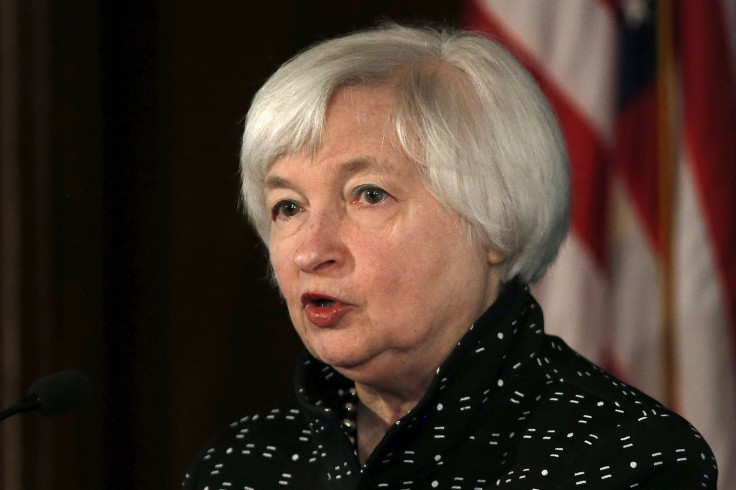US Fed Chair Janet Yellen Expected To Provide Clues To Post-Rate Hike Policy

The U.S. Federal Reserve Chairwoman Janet Yellen will speak at two separate events in Washington Wednesday, a day after Chicago Fed chief Charles Evans said that the central bank should “strongly and effectively” spell out the path to a gradual rate hike. The Fed has held interest rates near record lows since the 2008 financial crisis, and is now widely expected to begin tightening monetary policy later this month.
Yellen “will be focused on the idea that December seems likely,” and would, in all likelihood, start talking about the pace of the rate hike, Bloomberg reported, citing Tom Porcelli, the chief U.S. economist at RBC Capital Markets LLC in New York. Her speeches on Wednesday and Thursday could be critical in setting market expectations about the course of rate hike, and would be closely watched by traders and analysts.
The U.S. jobs report for November, scheduled to be released Friday, is expected to show an increase of 190,000 in nonfarm payrolls -- the same consensus for the October report, which proved much stronger at 271,000. However, while the low unemployment rate -- currently at 5 percent, which is very close to most policymakers’ estimates of full employment -- bolsters the case for a rate hike, a weak inflation outlook continues to cast doubts over the pace.
“The closer we get to Dec. 16 the more important it will be to convey the message that while cumulative progress toward full employment has been the driver of this initial move, thereafter progress on the inflation side of the mandate is going to be more important,” Alan Levenson, the chief economist at investment manager T. Rowe Price Group Inc. in Baltimore, told Bloomberg.
A rate hike is likely to spur capital to flow to higher-yielding, dollar-denominated assets, causing the dollar to strengthen further. The U.S. currency has already gained 9.2 percent this year against a basket of 10 global currencies. A stronger dollar would also hurt U.S. exports and further suppress inflation -- making the task of bringing inflation back toward the 2 percent goal much more difficult.
“We've had a parade of Fed speakers, and it's been very well choreographed and orchestrated around December,” Art Hogan, chief market strategist at Wunderlich Securities, told CNBC. “Does that narrative remain intact, and do we get any hints around monetary policy in 2016. The initial liftoff doesn't matter to us. It's going to be more about what happens in 2016. Are they going to be data dependent? And how much do they hike?”
© Copyright IBTimes 2025. All rights reserved.






















